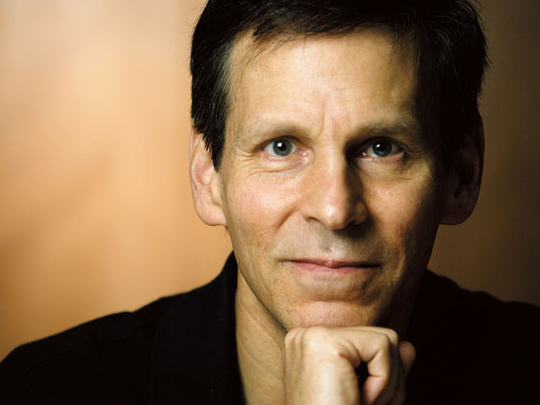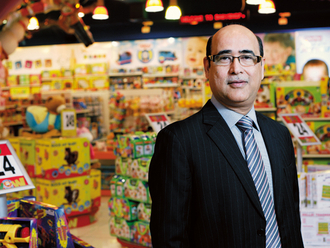
When you visit Rick Itzkowich's LinkedIn page and it suddenly starts talking to you - his own words coming right out of your computer speakers, unprompted - you quickly realise Itzkowich's grasp on the world's biggest business networking site is a lot tighter than most.
It's little wonder that he has earned himself the title ‘The LinkedIn Guy'. So many people kept asking for tips from the networking aficionado that the moniker finally stuck. Itzkowich's happy enough with it, though, and uses it himself on his LinkedIn page, along with the tag line: ‘Using LinkedIn to Turn Relationships Into Profits'.
Scroll down - past his CV, past all the recommendations from colleagues and seminar attendees (138 at last count!), and past his promotional summary inviting you to call today - and you'll find that his warm American accent has a face to go with it, and that Itzkowich's actually addressing his audience via a YouTube video clip, which he's uploaded at the bottom of his LinkedIn profile. It's programmed to play as soon as anyone arrives at the page. Clever technology, indeed - assuming you haven't got a face for radio.
Surprisingly Itzkowich's not suited and booted or framed by an all-American corporate logo-ed wall in the background. In fact, the California resident is sat in what looks like home, wearing a casual denim shirt, a shelf of kids' toys, family photos and football trophies behind him.
This aligns with Itzkowich's belief that business networking should be about building real relationships rather than closing deals. He often uses the acronym SN (meaning social networking), making business contacts accumulation sound like an exercise in making friends, and he maintains that people who burst on to networking sites with a sales pitch will fail.
That's not to say you should head to LinkedIn and start sharing baby photos or recounting your funniest brunch blunders, warns Itzkowich. That's what Facebook's for. In business utmost professionalism must be present at all times, but rather than asking for leads, contacts and deals, Itzkowich's ‘pay it forward' philosophy teaches networkers to do favours for others because good deeds are likely to reap the rewards you seek.
In short, help someone, and who knows, maybe they'll be in a position to help you too, if not directly then through one of their connections. If this seems like a long shot, consider how many connections a single LinkedIn member can have when there are 80 million members in total with a new one joining every second.
‘We are all our own brand'
Itzkowich's recent - and no doubt profitable - tour of the Middle East was borne of a LinkedIn connection. In his seminars he shares many more local LinkedIn success stories, before going on to reveal how to come out top in other people's LinkedIn searches so that when someone is looking for a person offering your skills or services, yours is the first face they see. Once you have someone's attention, your own personal branding is key. "We are all our own brand," says Itzkowich, "even when we are working for another company."
Itzkowich's main objective, then, is to teach others how to sell themselves, and his preferred platform from which to promote ‘brand you' is the world's biggest business networking site, LinkedIn.
With 20 years' experience in self-development and personal growth, combined with proven LinkedIn expertise and strategies, Itzkowich's the go-to guy of the hour, but it took walking away from the profitable family business and a run-in with the recession before he got here. Friday finds out more about the man behind ‘brand you'.
I
I started developing my networking skills when I got my first job in the US. I was born in Mexico City, and moved to the US in 1976. Now I'm based in San Diego. My primary role in that first job was to sell; of course networking became an essential skill to generate business. I soon found out that if I asked people to introduce me to others and vice versa, I'd get more business.
I was very active in sports while growing up. This made it easy for me to make friends and interact with people. You could say I was popular because I had lots of friends and acquaintances, but I was also somewhat shy when outside of my regular environment. I had two younger sisters, and yet I often joke that I was an only child with sisters because I was often unaware of what my sisters were doing. Much of life in my household revolved around my activities.
I grew up in an affluent neighbourhood in Mexico. Education was important and I was always expected to take over my father's business. He owned several steel factories. Unfortunately, my dream was to play professional baseball and I had no interest in steel. I went to a small private school in Mexico City, and was a good student, but I wasn't too interested in learning. I got good grades because I figured out what my teachers wanted, not because I was a good learner.
I was just 13 years old when my parents divorced. My mother and sisters went to live in England for two years and I was given the option of staying in Mexico or going to England - I was torn between the two choices. I must have changed my mind four or five times before finally staying, but I stayed in Mexico with my father in the end, and that was a major event in my life. I wasn't emotionally ready to make that choice and that significantly impacted on me throughout my life.
I went to the University of Southern California with the intention of playing baseball. In the US you can attend the first two years of college without declaring a major. After two years, I still didn't know what I wanted to do. My roommate was in film school and it sounded more fun than anything else I'd experienced so I decided to declare my major as film and TV production. I lasted a year, but since I was neither good at it nor interested in it, I dropped out. Ten years later, I decided to go back to school to earn my degree and I chose business as my major. Finally I graduated from the University of Phoenix with a bachelor's degree in Business Administration.
ME
Me and my networking skills
My mother was a university professor and my father was a businessman, but neither one was a particularly good networker, so my networking skills were developed rather than inherited. Networking is a skill that can be learnt by anyone. An experience when I was 15 years old taught me that you can accomplish much more with the help of others. My biggest mistake when I was younger was to not recognise just how important networking was, especially while studying at the University of Southern California. The people from USC tend to really help each other in business and I never took advantage of this.
Me and my rise to VP
My father and my grandfather were entrepreneurs and so am I. From that perspective my entrepreneurial roots were probably planted early on.
I first went to work for The Summit Organization, a personal development company founded by Paul Larson, my mentor. He inspired me to go into this industry as I was amazed by his insights into people. This was where I was originally in sales and then added training to my job description. I worked for that company for 12 years and then left to go back to Mexico and join my father's company. I lasted two years and it was a tough time for me.
My father had his own way of doing things and I always felt like I couldn't really be myself. I needed some outlet for my creativity and couldn't find it there. Also, my father is shrewd and his businesses are very successful. I felt that any success I had would be attributed to my father and not me.
I decided to return to the US and get back into the personal growth field. I paired up with an old colleague from Summit to start our own personal development company called PL&L (Productive Learning & Leisure). I'm the vice-president and my role includes delivering seminars.
Me and my learning philosophy
At my LinkedIn seminars, people are invited to bring their laptops to action everything they're learning. I believe adults learn better when they're doing something - the same way kids do. You can learn business skills from a great many things. For example, scuba diving can be a great exercise in communication.
PL&L runs what we call Learning Intensive Courses, in which these sorts of activities are offered. In one workshop about Manifesting Our Dreams we even send the class out to swim with whales. The experience is so awe-inspiring that we have people thinking about how much bigger dreams are achievable. It's a lesson in appreciating what we're capable of.
Me, LinkedIn and the world
I started using LinkedIn when the current economic climate forced me to look for alternative methods of finding new clients for PL&L. My success in generating business led me to promote others using LinkedIn for the same purpose. Soon people started calling me with questions and referring me to their colleagues.
That's how this all started. I've since done hundreds of seminars on LinkedIn in the US, and now I'm taking them across the globe. Besides the US, LinkedIn is now active in 200 countries. It's quickly gaining importance in the Middle East.
MYSELF
Do you believe that every business professional should upload their profile to LinkedIn and invest time in paying it forward in this online community?
There are only two reasons for being on LinkedIn: to find and to be found.
The more connections you have, the bigger your reach. The magic number I recommend is 500. Why? Because LinkedIn only shows the exact number of connections you have up to 500 people. After 500, the number shows as 500+ whether you have 501 or 5,000 connections. Those who are strategic about who they connect to tend to target people with at least 500 connections.
Reaching that number puts you in a better position to receive invitations from other very connected people.
Do many people pay it forward?
Yes, absolutely. I do it regularly. For example, I saw a question someone had posed for a female accountant in San Diego, where I live. I immediately forwarded this request to my accountant and it ultimately led to a substantial fee for her. Another introduction I made for a colleague led to a $30,000-order for them. I've also benefited personally from others paying it forward.
There was one time when I was having problems with email deliverability. I had created an email marketing product for subscribers, but many of the emails weren't being delivered due to server problems.
I posed a question on LinkedIn about this issue and one of the respondents was a chief technology officer from a Fortune 500 company who ended up spending about eight hours working on my problem without charging me a cent.
Eight hours seems a long time to spend on a favour for a network contact. What's the minimum time investment we can make on LinkedIn while still seeing benefits?
I recommend spending a minimum of one hour per week. The profile is the most important element of creating your LinkedIn brand, so spend most of your time on completing that initially. It should be treated as a sales page rather than a place to put your resumé. It should stand out. Add a video or slide show PowerPoint presentation by installing an application called SlideShare, and if you have one, import your business blog to have it display your latest posts on your profile page. This all attracts people to your profile.
What career achievement are you most proud of?
I'm relatively shy and used to be deadly afraid of speaking in front of people, but I've become an excellent speaker and facilitator despite this.
In business, what's your strongest belief?
Whatever transaction you engage in, it needs to benefit all parties. I also believe that business is a great unifier for people.
It is a universal language that we all speak and we can put whatever differences we may have aside so that we can prosper.
Sarah Hedley Hymers is a Dubai-based freelancer











